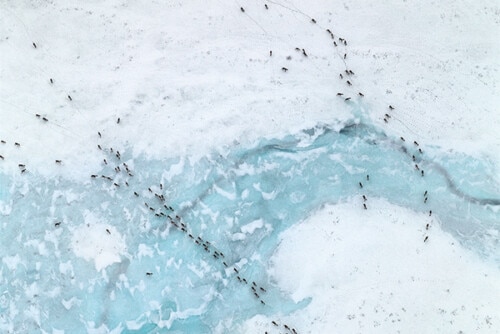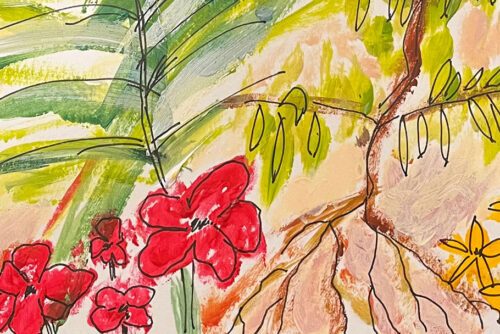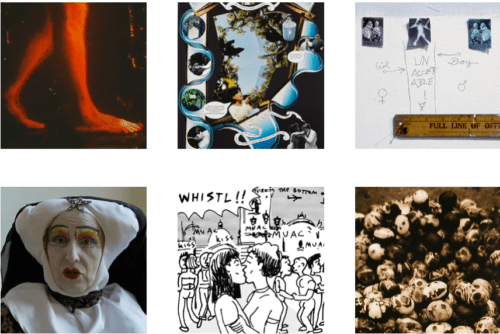Art (Click images below to enlarge)
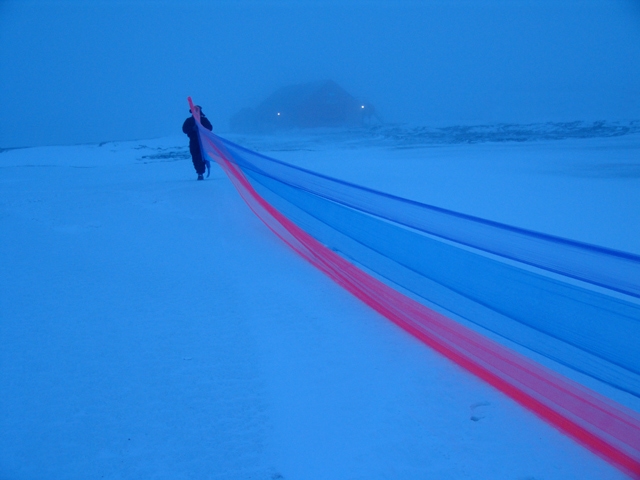
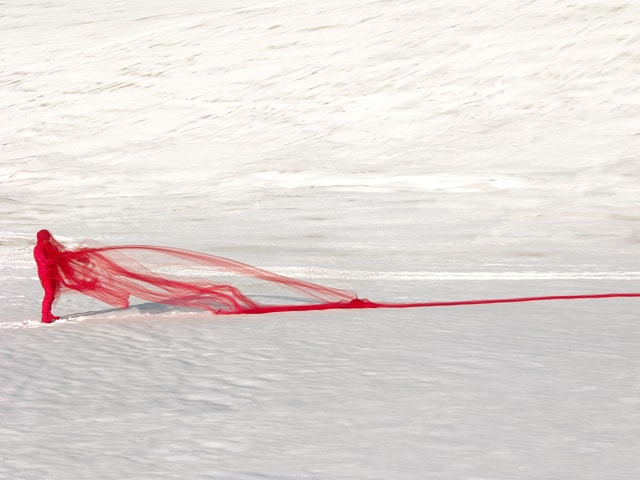
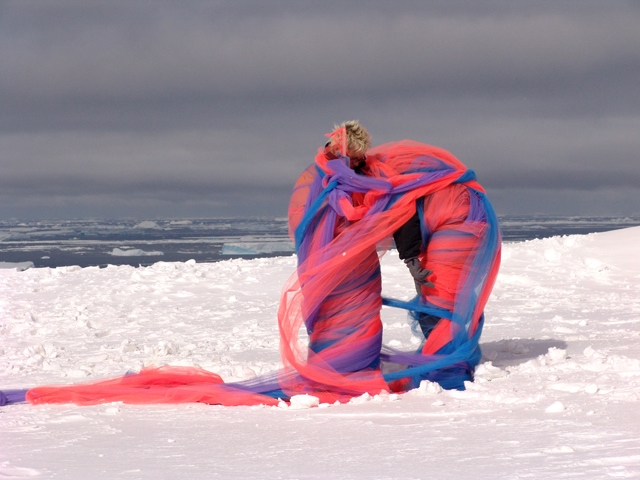
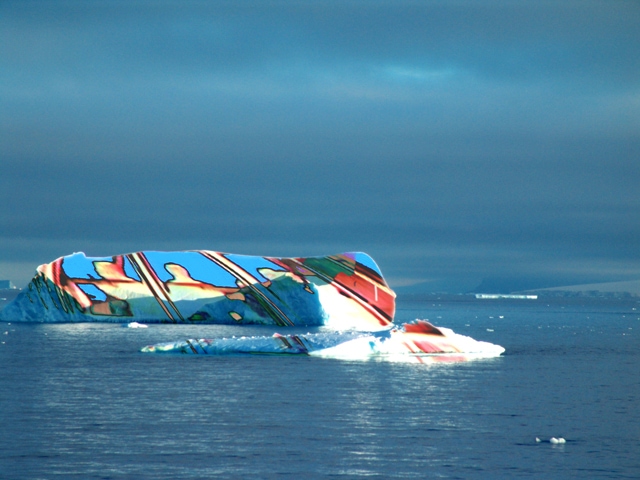
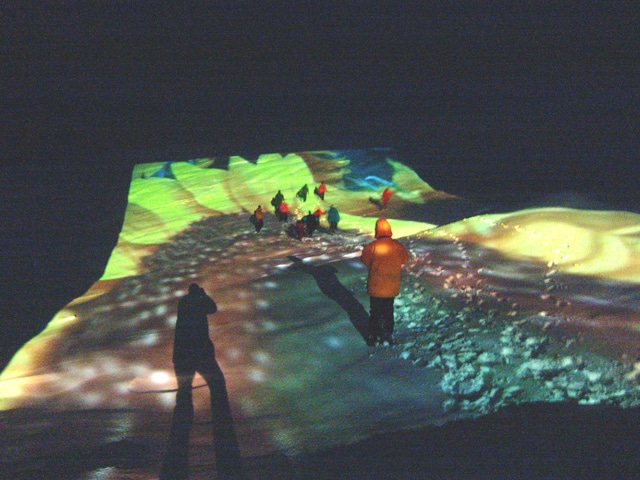
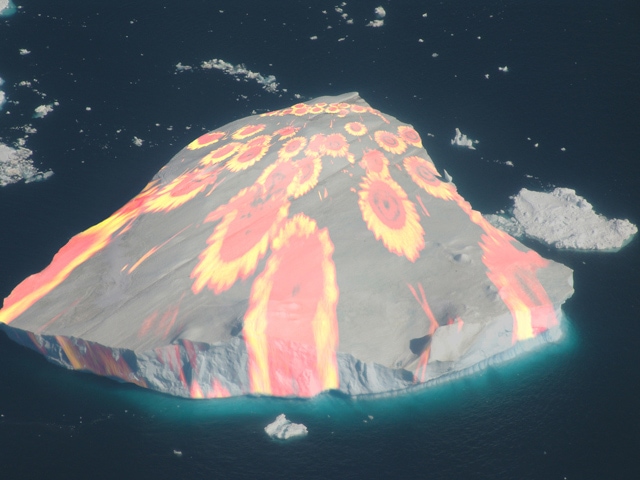
Artist Statement
The Antarctica Project
The light is so intense and bright that it modifies the colors throughout the day, while the horizon line blends into a white plane where the sun bounces
and never sets.
A deep and vivid feeling seizes me when, at the end of a long voyage, I step on Antarctic soil, a soil covered with fossils and a soil which houses the largest natural freshwater reserve on our planet. While there, I adapt to the weather and the severity of the freezing gales, where the beauty of the vastness of space and the extreme temperatures are juxtaposed. I see Antarctica as a virgin continent operating as an experimental laboratory in every discipline, including art, of course.
In May 2004, I began to develop a project to be undertaken in Antarctica, which relied on the support and enthusiasm of the Dirección Nacional del Antártico (Directorate for the Argentine Antarctica) and the Programa Antártico Argentino (Argentine Antarctic Program). Within this project, I attempt to ponder the calving of large masses of ice due to global warming, the resulting damage and indifference, and art from the extreme. Antarctic art reminds the world of its frozen seas, its species, and its icebergs, and how important they are for the terrestrial ecosystem.
Antarctica is losing its contour; a geography of perennial ice is turning into a series of clipped off pieces of land. Glacial masses are melting. Under their water layers, methane gas leaks and, as if in a closed circuit, ends up strengthening the greenhouse effect. Climate changes are accelerated and this provokes unimagined catastrophes. Masses of ice turn to water, causing seas to raise their level.
I have traveled to Antarctica four times since 2004, to work on art projects involving video projections using glaciers as the backdrop, performances on ice shelves during storms, photography and video. The entire project was based on research by two scientists: Dr. Rodolfo del Valle and Dr. Pedro Skvarca, who study the effects of climate change on ice shelves and the appearance of methane gas. The project was divided into performances and video installations, both using photography and video, three of which are described here:
“Methane”
“Methane” involved several performances which were carried out on the snowed plateau of Marambio. The performances engaged with the inaccessibility and loneliness of that frozen, foggy geography which is being slowly invaded by emanating toxic gases. “Methane” also reflected the effort humans make to avoid injury in those climate-related struggles.
Natural methane gas (CH4) produced the main thawing in the Antarctic after the last glaciations. This defrosting caused the sea level to rise some 100-120 meters, and this flooded some Antarctic areas, which were previously exposed to the atmosphere’s severe cold during the glaciations. Methane is one of the three most dangerous substances contributing to the greenhouse effect in the atmosphere, and the leaking of this gas into the atmosphere from the melting ice has destructive compounding effects on climate warming.
The atmosphere contains less methane than carbon dioxide, but due to this new imbalance in the methane polar reservoirs, methane is released into the atmosphere. This creates a feedback loop in which heat in the atmosphere melts the ice causing a rise in the sea level. This rise heats the methane reservoirs, leaking methane gas into the atmosphere which gets overheated and melts the ice. The melting ice produces water that goes into the ocean and causes a rise in the sea level, thus, the vicious circle is closed.
“Red (net)”
The performance “Red” was carried out over the Buenos Aires Glacier in Esperanza Bay in the Antarctic Peninsula. The title “Red” originates from a play on words between the English word for the color and the Spanish for weft or net. In the performance, a person dressed in red unfolded an eighty meter long piece of transparent red material over the surface of the glacier. The performance reflects on people as manipulators of the environment, interfering in their surroundings and originating drastic changes on terrestrial surfaces. It insinuates the involvement of wounds, passion and blood.
The past two decades were probably the warmest during the last five centuries. In the preceding twenty years there have been many drastic changes in the glaciers and the ice shelves of the Antarctic Peninsula induced by atmospheric and oceanic warming. The major changes correspond to the disintegration of Sectors A and B of the Larsen Ice Shelf, and their influence in the dynamics of those glaciers that fed them. We noticed that both events took place and coincided with the two warmest summers in the region. In areas where the ice shelves no longer exist, the glaciers have started to accelerate, to lose thickness significantly, to experience beats and to recede behind the lines of support, all of which contributed to a rise in the sea level.
“Projection”
Two videos, “Sunflowers” (20 minutes, 2004) and “Encapsulated” (10 minutes, 2004), were projected on the icy land of Base Marambio and on the hillside (thus generating a 120 meter high image) and on the base of Buenos Aires glacier in Base Esperanza. We used the whiteness of the glacial ice as a screen and its dwellers as performers in the installation. The dwellers (the staff of Marambio and Esperanza, together with their spouses, children and the children’s teachers) moved to and from the flames and sunflowers shown on the frozen soil, giving this event a peculiar and quite moving character.
“Sunflowers” was shot at the growth site of these plants, the Argentine Pampas, where they seem to fester under the effects of the wind. The field is peaceful until the sunflowers catch fire; they burn one after the other until the whole field becomes a huge, devastating blaze. Fire covers the entire image up to the moment this dies out, leaving only an empty space after it. The sunflower presents a perfect dichotomy: ornamentation versus human food source.
“Encapsulated” depicts human hostility in huge urban centers. In the video, a group of people is locked in a transparent capsule of a metallic structure. The structure rockets up until it disappears into the skies while a new group of encapsulated beings start their infinite itineraries.
Artist Links
Website
